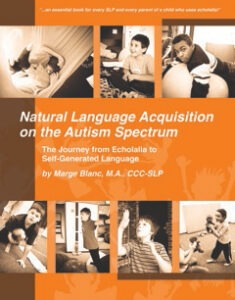Christie is a mom and a natural communication partner! Her blog is particularly instructive because Christie talks about how natural it was for *her* when her daughter emerged into Stage 4 — ‘dysfluencies’ and all. Not true dysfluencies, Stage 4 brings ‘mazing’ with it. This is so common that we have now come to expect the phenomenon with a child’s first self-generated language.
It’s because Stage 4 kids have no more ‘echos in the back of their heads.’ No more ‘intonations’ or ‘melodies’ to carry them forward! But Christie expected that of Stage 4! How? Mom’s intuition? Reading about it? A combination? Christie said she did worry at first — but witnessing the ebbs and flows of grammar development — and access — she quit worrying. You can too!
Christie’s story is evolving…please stay tuned for more chapters!
Layla’s story. 1
Layla’s story. 2
Layla’s story. 3
Layla’s story.4
Layla’s story.5
“In this video, Layla is 4 years old. She was using mostly Stage 4 language, but she was fairly new to Stage 4 and still using a lot of Stage 2, especially outside of the home, during imaginary play, or with new people. Her sentences were small and you could hear that they were being carefully pieced together and that took effort. But she was experimenting with her new language and her sentences were growing every day. This is also around the same time we started to notice the mazing. At the time we didn’t immediately know what it was, and suspected she was maybe starting to develop a stutter. This also coincided with all of these ‘what’ questions she had about everything in life. It was either “what’s that?” “What is it?” or “What they/you doin?”
Looking back, this was probably Layla’s most awkward-sounding stage with the most noticeable differences, but big things were taking place, and she just needed support and patience at this point. Eventually as Stage 4 progressed, the periods of mazing came and went, almost always with a noticeable language leap as she was attempting and experimenting with harder things. Through talking to Marge to understand what mazing actually was, and witnessing the correlation between mazing and language growth, we’ve come to the conclusion that it’s as normal as leg pain is to a growth spurt. Marge also added this comment: ‘It’s interesting to see how Layla first tried to ask “What are those guys doing?” and when it was too hard, gradually shortened her question to “What they doing?” and then “What doing?” or “They doing?” so she could keep the conversation going. As we always say, “Meaning before grammar!’ “
Stage 4 wildly varied from beginning to end and the amount of effort our kids put into it is amazing. I feel blessed to have an understanding of NLA to be able to recognize and appreciate the beauty of our daughter’s language journey.”
